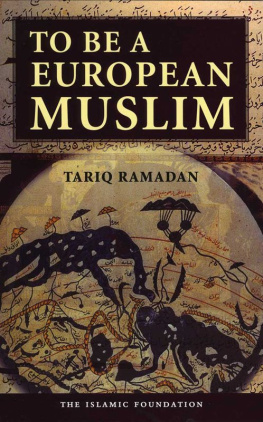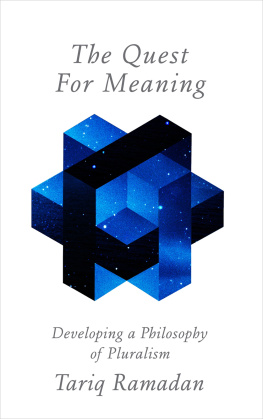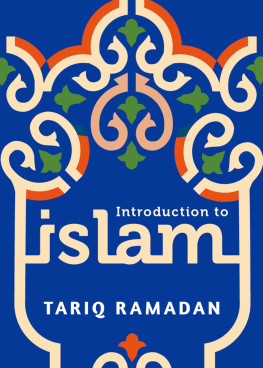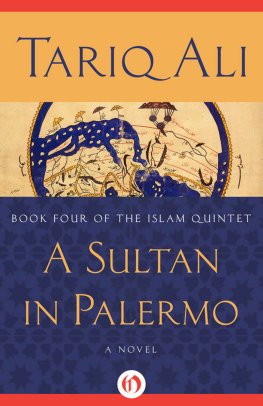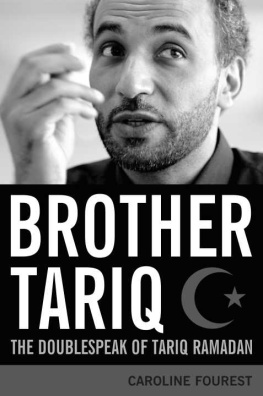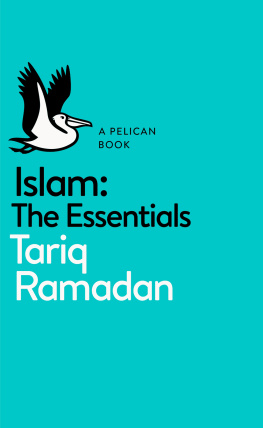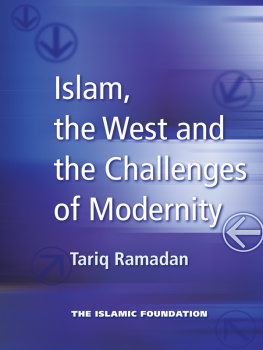Tariq Ramadan - To Be a European Muslim
Here you can read online Tariq Ramadan - To Be a European Muslim full text of the book (entire story) in english for free. Download pdf and epub, get meaning, cover and reviews about this ebook. year: 2013, publisher: Kube Publishing Ltd, genre: Religion. Description of the work, (preface) as well as reviews are available. Best literature library LitArk.com created for fans of good reading and offers a wide selection of genres:
Romance novel
Science fiction
Adventure
Detective
Science
History
Home and family
Prose
Art
Politics
Computer
Non-fiction
Religion
Business
Children
Humor
Choose a favorite category and find really read worthwhile books. Enjoy immersion in the world of imagination, feel the emotions of the characters or learn something new for yourself, make an fascinating discovery.
- Book:To Be a European Muslim
- Author:
- Publisher:Kube Publishing Ltd
- Genre:
- Year:2013
- Rating:3 / 5
- Favourites:Add to favourites
- Your mark:
- 60
- 1
- 2
- 3
- 4
- 5
To Be a European Muslim: summary, description and annotation
We offer to read an annotation, description, summary or preface (depends on what the author of the book "To Be a European Muslim" wrote himself). If you haven't found the necessary information about the book — write in the comments, we will try to find it.
To Be a European Muslim — read online for free the complete book (whole text) full work
Below is the text of the book, divided by pages. System saving the place of the last page read, allows you to conveniently read the book "To Be a European Muslim" online for free, without having to search again every time where you left off. Put a bookmark, and you can go to the page where you finished reading at any time.
Font size:
Interval:
Bookmark:
Other titles by the same author
Les musulmans dans la lacit, responsabilits et droits des musulmans dans les socits occidentales, Tawhid, Lyon, 1994, 2nd edition 1998
Islam, le face face des civilisations, Quel projet pour quelle modernit?, Les deux Rives, Lyon, 1995, 2nd edition 1998
Aux sources du renouveau musulman, Un sicle de rformisme islamique, Bayard-Centurion, Paris, September 1998
Peut-on vivre avec lIslam?, talks with Jacques Neirynck, Favre, Lausanne, March 1999
Muslims in France: The way towards coexistence, Islamic Foundation, Leicester, UK, 1999
In collaboration:
Pril islamiste?, directed by Alain Gresh, Complexe, Brussels, 1995
La tolrance ou la libert? Les leons de Voltaire et de Condorcet, directed by Claude-Jean Lenoir, Complexe, Brussels, 1997
Islam, Modernism and the West, edited by Gema Martin Munoz, I.B.Tauris, London, January 1999
To be a
European Muslim
A Study of Islamic Sources in the
European Context
TARIQ RAMADAN
The Islamic Foundation
Published by
THE ISLAMIC FOUNDATION,
Markfield Conference Centre,
Ratby Lane, Markfield, Leicester LE67 9SY, UK
Tel: (01530) 244944, Fax: (01530) 244946
E-mail:
Web site: http://www.islamic-foundation.com
Quran House, PO Box 30611, Nairobi, Kenya
PMB 3193, Kano, Nigeria
The Islamic Foundation, 1999/1420 H;
Reprint 2002/1423 H, 2005/1425 H and 2010/1431 H
Kube Publishing Ltd.
Tel: +44(0)1530 249230, Fax: +44(0)1530 249656
Email:
All rights reserved. No part of this publication may be reproduced, stored in a retrieval system, or transmitted in any form or by any means, electronic, mechanical, photocopying, recording or otherwise, without the prior permission of the copyright owner.
ISBN 978-0-86037-300-1 (PB)
ISBN 978-0-86037-315-5 (HB)
Cover design: Imtiaz Ahmad Manjra
Typeset by: N.A. Qaddoura
Cover Illustration: Map of North Africa and Europe drawn by al-Idrisi. Africa is on the top part of the globe, Europe is on bottom part of the globe.
For Maryam,
(and Rum)
for your infinite sensitivity.
Hoping you never let anyone
turn your qualities into faults
For Sami,
Sad
for your outlandish imagination.
May you be ready to help everybody,
attentive to all, ever
For Moussa,
for your playful sweetness.
A rebel, if you can be,
in the name of justice,
in the name of all men
God love and protect you

Part One: AT THE HEART OF THE SOURCES
FAITH AND RELIGIOUS PRACTICE
The present book was written two years ago as I was carrying out a years research in Leicester, in the Islam in Europe unit of the Islamic Foundation. I must first of all acknowledge the excellent research facilities offered me at the Islamic Foundation. I particularly want to thank the Foundations Chairman, Professor Khurshid Ahmad, and its Director, Dr. Manazir Ahsan, for their warm welcome. Numerous discussions with Dr. Ataullah Siddiqui, Dilwar Hussain, Sohail Nakhooda, Mokrane Guezzou, Anwar Cara and Batool al-Toma enabled me, thanks to their help and advice, to develop the present research in the desired direction. To them all, I am fraternally grateful. I do not forget Khurram Murad (God have mercy on him) who more than once deeply touched me with his kindness. A word, also, for all those who have been following my work for years and who help make it accessible. This book could not have been completed without the questioning and suggestions of Yamine Makri.
This book also owes a lot to the memory of my father (God have mercy on him) and to his very specific approach to legal issues slowly elaborated and fashioned all along my theoretical studies on Islamic law and jurisprudence. It is also greatly indebted to all those who, in one way or another, accompanied me along the road and who, through their own studies and reflections and/or through their own field experience, have enriched me with their opinions and remarks: I am thinking in particular of Tarek Oubrou, Fouad Imarraine, Mamadou Daffe, Abd al-Halim Herbert, Larbi Kechat, Abdelaziz Chambi, Didier Bourg, Tayyeb Shah, Malika Dif, Ubaid Allah Gloton, Yusuf Islam, Ahmad Jaballah, Ahmad Bouziane, Farid Abdelkarim, Yacoub Mahi, Ibrahim Hewitt, Abd as-Samad, and many others, who have also directly or indirectly helped fashion the contents of the present work and who have encouraged me to present its substance in a new manner. They are my attentive and friendly brothers and sisters: I pray God to protect and love them. My thoughts, my invocations, my fraternity and my love accompany you, all.
The friends, companions or partners in the long, intense and sometimes repeated debates over the issues of coexistence, pluralism and secularism are also present in my memory: Jrgen Nielsen, Peter Clark, Jocelyn Cesari, Philippe Lewis, Franois Burgat, Pierre Dufresne, Isabelle Ducret, Albert Jacquard, Michel Morineau, Pierre Tournemire, Patrice Mugny, Guy Coq, Juan Martinez, Nathalie Dolle, Claude Torracinta, Alain Gresh, Robert Bistolfi, Jean Boussinesq, Henri Tincq, Jacques Neirynck, Jacqueline Costa-Lascoux, Christian Delorme, Richard Friedli, Jean-Claude Basset, Patrick de Laubier, Jean Offredo, Gilles Couvreur, Edmond Blattchen, Olivier Roy, Gema Martin Muoz, Dominique Roulin, among so many other interlocutors. Their friendly or critical, direct or indirect contributions were of the most helpful, along with those of other interlocutors. Though it would be impossible to mention them all here, I extend to every one of them my heartfelt gratitude.
My wife Iman does more than accompany me. Along the road, she challenges, argues, questions, criticises. For so many years, she has been the mirror in whose reflections an important part of my thought has found its source and orientation. I have been able to understand a dimension of Gods love by pondering over the priceless value of His gifts: my wife, her heart, her intelligence, and our children. Thanks for her presence, thanks for her patience.
| Geneva, | Tariq Ramadan |
| March 1999 |
It is now a generation since western Europeans began to notice that there were Muslim communities settling in our cities. The days of the temporary migrant worker had been replaced by the establishment of families in a process which was clearly going to be permanent. The first mosques started appearing, and we began to pay attention. As we looked behind the superficial developments we discovered that there had been Muslims in Western Europe for a long time, in some cases for centuries, although in smaller numbers. The new presence in Western Europe served also to remind us that there were already well-established Muslim communities in parts of Eastern Europe even if we thought we could safely ignore them hidden away behind the Iron Curtain. The new presence reminded us of our own presence in the Muslim world, in the form of empire.
But, of course, while we were paying attention to the changes we had to deal with and the reluctance to do so in some quarters assumptions were also being made about the impact of this new situation on Muslims themselves. The early simplistic conclusions were that with the passage of time, perhaps over one generation, the new immigrant communities would have become assimilated, at least in the sense that their attitude to religion and its requirements would have been Europeanised. Some observers suggested that intermarriage in particular would be a major factor in this expected process of assimilation. Now, one generation later, the picture looks radically different from what those earlier we might now call them nave observers thought.
Font size:
Interval:
Bookmark:
Similar books «To Be a European Muslim»
Look at similar books to To Be a European Muslim. We have selected literature similar in name and meaning in the hope of providing readers with more options to find new, interesting, not yet read works.
Discussion, reviews of the book To Be a European Muslim and just readers' own opinions. Leave your comments, write what you think about the work, its meaning or the main characters. Specify what exactly you liked and what you didn't like, and why you think so.

